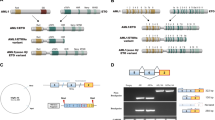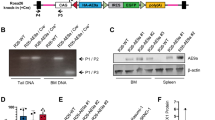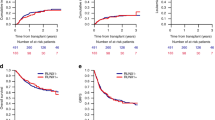Abstract
t(8;21)(q22;q22) results in the AML1-ETO (A1E) fusion gene and is a common cytogenetic abnormality in acute myeloid leukemia (AML). Although insertions at the breakpoint region of the A1E fusion transcripts have been reported, additional structural alterations are largely uncharacterized. By RT–PCR amplifications and DNA sequencing, numerous in-frame and out-of-frame AML1b-ETO and AML1c-ETO transcripts were identified in 13 pediatric t(8;21) AMLs, likely resulting from alternate splicing, internal deletions and/or breakpoint region insertions involving both the AML1 (RUNX1) and ETO regions. The in-frame A1E fusion transcript forms represented minor forms. These structure alterations were found in AML1c-ETO but not AML1b-ETO transcripts in two adult t(8;21) AMLs. Although no analogous alterations were detected in native AML1b transcripts, identical alterations in native ETO transcripts were identified. When transfected into HeLa cells, only AML1b, and not the in-frame A1E forms, transactivated the GM-CSF promoter. In co-transfection experiments, the effects of A1E proteins on GM-CSF transactivation by AML1b ranged from repressive to activating. Our results demonstrate a remarkable and unprecedented heterogeneity in A1E fusion transcripts in t(8;21) myeloblasts and suggest that synthesis of alternate A1E transcript and protein forms can significantly impact the regulation of AML1 responsive genes.
This is a preview of subscription content, access via your institution
Access options
Subscribe to this journal
Receive 50 print issues and online access
$259.00 per year
only $5.18 per issue
Buy this article
- Purchase on SpringerLink
- Instant access to the full article PDF.
USD 39.95
Prices may be subject to local taxes which are calculated during checkout





Similar content being viewed by others
References
Becton D, Dahl GV, Ravindranath Y, Chang MN, Behm FG, Raimondi SC et al. (2006). Randomized use of cyclosporin A (CsA) to modulate P-glycoprotein in children with AML in remission: Pediatric Oncology Group Study 9421. Blood 107: 1315–1324.
Bloomfield CD, Lawrence D, Byrd JC, Carroll A, Pettenati MJ, Tantravahi R et al. (1998). Frequency of prolonged remission duration after high-dose cytarabine intensification in acute myeloid leukemia varies by cytogenetic subtype. Cancer Res 58: 4173–4179.
Byrd JC, Dodge RK, Carroll A, Baer MR, Edwards C, Stamberg J et al. (1999). Patients with t(8;21)(q22;q22) and acute myeloid leukemia have superior failure-free and overall survival when repetitive cycles of high-dose cytarabine are administered. J Clin Oncol 17: 3767–3775.
Chang M, Raimondi SC, Ravindranath Y, Carroll AJ, Camitta B, Gresik MV et al. (2000). Prognostic factors in children and adolescents with acute myeloid leukemia: univariate and recursive partitioning analysis of patients treated on Pediatric Oncology Group (POG) Study 8821. Leukemia 14: 1201–1207.
Entz-Werle N, Suciu S, Van Der Werff ten Bosch J, Vilmer E, Bertrand Y, Benoit Y, et al., on behalf of EORTC Children Leukemia Group (CLG). (2005). Results of 58872 and 58921 trials in acute myeloblastic leukemia (AML) and relative value of chemotherapy vs allogeneic bone marrow transplantation (alloBMT) in 1st complete remission: the EORTC Children Leukemia Group report. Leukemia 19: 2072–2081.
Erickson P, Gao J, Chang KS, Look T, Whisenant E, Raimondi S et al. (1992). Identification of breakpoints in t(8;21) acute myelogenous leukemia and isolation of a fusion transcript, AML1/ETO, with similarity to Drosophila segmentation gene, runt. Blood 80: 1825–1831.
Erickson PF, Dessev G, Lasher RS, Philips G, Robinson M, Drabkin HA . (1996). ETO and AML1 phosphoproteins are expressed in CD34+ hematopoietic progenitors: implications for t(8;21) leukemogenesis and monitoring residual disease. Blood 88: 1813–1823.
Frank R, Zhang J, Uchida H, Meyers S, Hiebert SW, Nimer SD . (1995). The AML1/ETO fusion protein blocks transactivation of the GM-CSF promoter by AML1B. Oncogene 11: 2667–2674.
Grimwade D, Walker H, Oliver F, Wheatley K, Harrison C, Harrison G et al. (1998). The importance of diagnostic cytogenetics on outcome in AML: analysis of 1,612 patients entered into the MRC AML 10 trial. The Medical Research Council Adult and Children's Leukaemia Working Parties. Blood 92: 2322–2333.
Kardos G, Zwaan CM, Kaspers GJ, De-Graaf SS, De Bont ES, Postma A et al. (2005). Treatment strategy and results in children treated on three Dutch Childhood Oncology Group acute myeloid leukemia (AML) trials. Leukemia 19: 2063–2071.
Klampfer L, Zhang J, Zelenetz AO, Uchida H, Nimer SD . (1996). The AML1/ETO fusion protein activates transcription of BCL-2. Proc Natl Acad Sci USA 93: 14059–14064.
Leroy H, De Botton S, Grardel-Duflos N, Leleu X, Roumier C, Morschhauser F et al. (2005). Prognostic value of real-time quantitative PCR (RQ-PCR) in AML with t(8;21). Leukemia 19: 367–372.
Ge Y, Stout ML, Tatman DA, Jensen TL, Buck S, Thomas RL et al. (2005). GATA1, cytidine deaminase, and the high cure rate of Down syndrome children with acute megakaryocytic leukemia. J Natl Cancer Inst 97: 226–231.
Lu Y, Xu YB, Yuan TT, Song MG, Lubbert M, Fliegauf M et al. (2006). Inducible expression of AML1-ETO fusion protein endows leukemic cells with susceptibility to extrinsic and intrinsic apoptosis. Leukemia 20: 987–993.
Lutterbach B, Hiebert SW . (2000). Role of the transcription factor AML-1 in acute leukemia and hematopoietic differentiation. Gene 245: 223–235.
Lutterbach B, Sun D, Schuetz J, Hiebert SW . (1998). The MYND motif is required for repression of basal transcription from the multidrug resistance 1 promoter by the t(8;21) fusion protein. Mol Cell Biol 18: 3604–3611.
Marcucci G, Caligiuri MA, Bloomfield CD . (2000). Molecular and clinical advances in core binding factor primary acute myeloid leukemia: a paradigm for translational research in malignant hematology. Cancer Invest 18: 768–780.
Michaud J, Scott HS, Escher R . (2003). AML1 interconnected pathways of leukemogenesis. Cancer Invest 21: 105–136.
Miyoshi H, Ohira M, Shimizu K, Mitani K, Hirai H, Imai T et al. (1995). Alternative splicing and genomic structure of the AML1 gene involved in acute myeloid leukemia. Nucleic Acid Res 23: 2762–2769.
Nucifora G, Birn DJ, Erickson P, Gao J, LeBeau MM, Drabkin HA et al. (1993). Detection of DNA rearrangements in the AML1 and ETO loci and of an AML1/ETO fusion mRNA in patients with t(8;21) acute myeloid leukemia. Blood 81: 883–888.
Perel Y, Auvrignon A, Leblanc T, Michel G, Reguerre Y, Vannier JP, et al., for the Group LAME of the Societe Francaise des Cancers de lÉnfant (SFCE), France. (2005). Treatment of childhood acute myeloblastic leukemia: dose intensification improves outcome and maintenance therapy is of no benefit—multicenter studies of the French LAME (Leucémie Aiguë Myéloblastique Enfant) Cooperative Group. Leukemia 19: 2082–2089.
Peterson LF, Zhang DE . (2004). The 8;21 translocation in leukemogenesis. Oncogene 23: 4255–4262.
Raimondi SC, Chang MN, Ravindranath Y, Behm FG, Gresik MV, Steuber CP et al. (1999). Chromosomal abnormalities in 478 children with acute myeloid leukemia: clinical characteristics and treatment outcome in a cooperative pediatric oncology group study—POG 8821. Blood 94: 3707–3716.
Rubnitz JE, Raimondi SC, Halbert AR, Tong X, Srivastava DK, Razzouk BI et al. (2002). Characteristics and outcome of t(8;21)-positive childhood acute myeloid leukemia: a single institution's experience. Leukemia 16: 2072–2077.
Saunders MJ, Tobal K, Keeney S, Liu Yin JA . (1996). Expression of diverse AML1/MTG8 transcripts is a consistent feature in acute myeloid leukemia with t(8;21) irrespective of disease phase. Leukemia 10: 1139–1142.
Schlenk RF, Benner A, Krauter J, Buchner T, Sauerland C, Ehninger G et al. (2004). Individual patient data-based meta-analysis of patients aged 16 to 60 years with core binding factor acute myeloid leukemia: a survey of the German Acute Myeloid Leukemia Intergroup. J Clin Oncol 22: 3741–3750.
Schnittger S, Weisser M, Schoch C, Hiddemann W, Haferlach T, Kern W . (2003). New score predicting for prognosis in PML-RARA+, AML1-ETO+, or CBFBMYH11+ acute myeloid leukemia based on quantification of fusion transcripts. Blood 102: 2746–2755.
Smith FO, Alonzo TA, Gerbing RB, Woods WG, Arceci RJ, for the Children's Cancer Group. (2005). Long-term results of children with acute myeloid leukaemia: a report of three consecutive phase III trials by the Children's Cancer Group: CCG251, CCG 213 and CCG 2891. Leukemia 19: 2054–2062.
Strout MP, Marcucci G, Caligiuri MA, Bloomfield CD . (1999). Core-binding factor (CBF) and MLL-associated primary acute myeloid leukemia: biology and clinical implications. Ann Hematol 78: 251–264.
Tanaka T, Tanaka K, Ogawa S, Kurokawa M, Mitani K, Nishida J et al. (1995). An acute myeloid leukemia gene, AML1, regulates hemopoietic myeloid cell differentiation and transcriptional activation antagonistically by two alternative spliced forms. EMBO J 14: 341–350.
Wolford JK, Prochazka M . (1998). Structure and expression of the human MTG8/ETO gene. Gene 212: 103–109.
Yan M, Burel SA, Peterson LF, Kanbe E, Iwasaki H, Boyapati A et al. (2004). Deletion of an AML1-ETO C-terminal NcoR/SMRT-interacting region strongly induces leukemia development. Proc Natl Acad Sci USA 101: 17186–17191.
Yan M, Kanbe E, Peterson LF, Boyapati A, Miao Y, Wang Y et al. (2006). A previously unidentified alternatively spliced isoform of t(8;21) transcript promotes leukemogenesis. Nat Med 12: 945–949.
Yoo SJ, Chi HS, Jang S, Seo EJ, Seo JJ, Lee JH et al. (2005). Quantification of AML1-ETO fusion transcript as a prognostic indicator in acute myeloid leukemia. Haematologica 90: 1493–1501.
Acknowledgements
We thank Dr Robert J Arceci and the Children's Oncology Group AML Biology Subcommittee for authorizing and providing the clinical specimens that made this study possible. This work was supported by grants from the Karmanos Cancer Institute, Leukemia Research Life, the Children's Research Center of Michigan, the Children's Leukemia Foundation of Michigan, the National Cancer Institute (CA92308 and CA76641), the Leukemia and Lymphoma Society, BPCT Golf Charity, the Sehn Family Foundation and the Dale Meyer Memorial Endowment for Leukemia Research. JW Taub is a Scholar in Clinical Research of the Leukemia and Lymphoma Society. This work was also supported by the Pediatric Oncology Group Grant CA30969 and the Children's Oncology Group Grant CA98543.
Author information
Authors and Affiliations
Corresponding author
Additional information
Supplementary Information accompanies the paper on the Oncogene website (http://www.nature.com/onc).
Supplementary information
Rights and permissions
About this article
Cite this article
LaFiura, K., Edwards, H., Taub, J. et al. Identification and characterization of novel AML1-ETO fusion transcripts in pediatric t(8;21) acute myeloid leukemia: a report from the Children's Oncology Group. Oncogene 27, 4933–4942 (2008). https://doi.org/10.1038/onc.2008.134
Received:
Revised:
Accepted:
Published:
Issue date:
DOI: https://doi.org/10.1038/onc.2008.134



